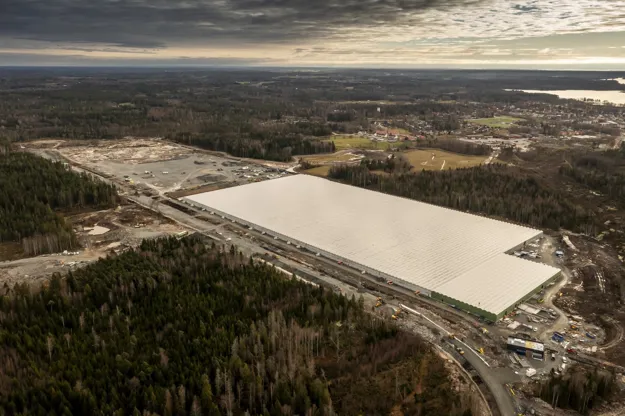In a new 10-hectare project in Frövi, Sweden, residual heat from a nearby paper mill will be utilized to cultivate tomatoes year-round. Commencing next year, the team intends to supply the local market with this produce. And there’s more coming up: project developer WA3RM designed a business model that unites industries dealing with surplus heat and those capable of utilizing it. “The best thing to do when you have almost free heat is to grow things,” says co-founder and deputy CEO Fredrik Indebetou.

Founded in 2015, but with the concept being developed 7 years prior at the European Spallation Source (ESS), one of the world’s most advanced research facilities, the Swedish development company focuses on making energy-intensive industries more sustainable. The company's name, WA3RM, encapsulates its three core principles: Renewable, Recyclable, and Responsible. With an objective to recycle 100% of waste streams and waste heat, WA3RM has delved into greenhouse cultivation, offering major industries an avenue to sell their waste streams and providing an all-encompassing solution.
"Waste streams always pose a challenge for industries, so waste-producing industries are eager to find a solution. We identify the right applications, design the system, and handle the financing and development. An example of a comprehensive solution can be a greenhouse, fiber sludge, or agriculture", explains Fredrik. “It goes the other way around as well: In Sweden we have access to water, land, electricity, and clean water, which are all enabling factors to start a greenhouse operation, but the almost free heat is the key component.”

The inaugural 20-hectare greenhouse project, with the initial 10 hectares near completion, is undertaken by KUBO and is located within a 2.5-hour drive from Stockholm. The heat source is a nearby pulp and paper facility, sustaining year-round tomato cultivation to meet market demand. FoodVentures, experienced in operating greenhouses in less experienced countries, will oversee the operation. "Dirk Aleven is open-minded, experienced, and fluent in English, giving us confidence in the outcome,” Fredrik says.
More greenhouses coming up
Fredrik anticipates the 20-hectare facility will be the largest unit in the Nordics, with WA3RM aspiring for more extensive ambitions. Concurrently, they have engaged with numerous industries in Sweden, including one above the Arctic Circle linked to the Hybrit, major green steel production site in Gällivare, which collaborates with Swedish mining company LKAB and aims to be fossil-free—a crucial element in Frederik's long-term vision. "Natural gas is still a finite resource, and we must eventually phase it out. It is the same in horticulture: even if you maximize the use of natural gas by implementing a CHP, you’re still depending on natural gas." As for Hybrit, supplying 90% of European iron, aims to replace the carbon component with hydrogen. "It will require 50% of Sweden's current annual power production. The generated waste heat is approximately twice the size of Lithuania's heat demand. While we can't recycle everything, we are poised to realize a project there.". Another project in development is related to a large datacenter, co-developed with EcoDataCenter, which currently is one of Sweden’s biggest construction projects.

The WA3RM team is open to discussions about these projects, as they are not reliant on external financing capital to execute them. "We've initiated our own fund, covering our first four projects in equity terms. This means we control everything, which brings a lot of freedom,” he says, adding that completing the finance was a tough hurdle to take, especially since the greenhouse industry in Sweden is under-developed.
“There are no support systems, no political recognition – it’s found odd, at least. Positioning ourselves has been eight years of work, and now it’s paying off.” As WA3RM sees their solution for residual heat, they expect this project to become a ‘best practice’ example and will spread through the union. “It will make things easier like connecting to the energy net or questioning answers around permits. And when the industry understands what we’re offering and starts to see the symbiosis, we can co-invest and co-create, enabling shared infrastructures, saving money and becoming more efficient without fossil fuels, which is the core essence of what we’re doing.”

Price vs sustainability?
Regardless of how sustainable and locally produced the goods are, the current cost of production in Sweden doesn't surpass that of imported produce. Fredrik notes, "Labor and capital expenditure are the major costs of a facility. While we are part of a Swedish grower union for sales, we cannot compete with low-cost imports in terms of pricing." In a market where negotiations typically revolve around price, Fredrik is confident that the first to offer a surplus will dominate the market. "We import approximately 70% of vegetables in Sweden. The significant issue lies in the production, especially in Southern parts of Europe like Spain and Northern Africa. We need to take proactive measures instead of reacting to unfolding events. Retailers can play a role in replacing imports by sourcing from local, accountable projects. Major purchasing entities can effect substantial change by dictating the characteristics of the vegetables they buy. Consumers often have no idea of what they are buying, but the first retailer to inform them about this can own the market. We advocate collaboration to address current and impending macroeconomic, labor, and climate-related challenges."
For more information:
Niklas Rydberger
WA3RM
Head of Communication
Phone +46 735 08 42 88
Mail [email protected]
Web www.wa3rm.com
